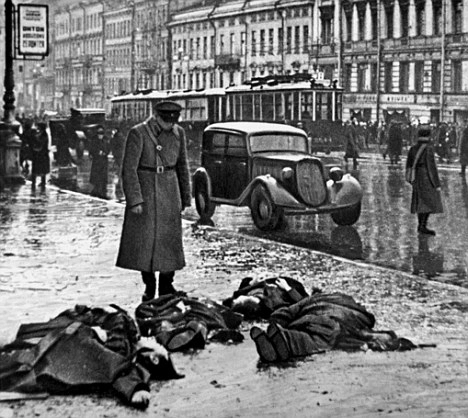Symphony No. 7, also known as “The Leningrad Symphony,” was a tribute to this siege, and acted as an outlet for the frustration and pain that Shostakovich and the public shared.
SYMPHONY NO. 7: LENINGRAD
On June 22nd, 1941, during World War II, the Nazi army invaded Russia and forced the city of Leningrad—formerly St.
Petersburg—under siege for two and a half years, which killed roughly one million citizens.

Dead bodies in the street.
(Courtesy of History Collection).

A woman carrying a dead body (Courtesy of
History Learning Site).

Civilians cleaning up rubble after a bombing (Courtesy of History.com).
“Shostakovich’s 7th, though it is no blatant battle piece, is an interpretation of Russia at war.”
~ TIME Magazine, 1942
1st Movement
The 1st movement opens with a commanding theme which turns into a foreboding march.
“The deceptively simple opening melody, suggestive of peace, work, hope, is interrupted by the theme of war, 'senseless, implacable and brutal.”
~ TIME Magazine, 1942
Opening theme of Symphony No. 7 (Courtesy of the Netherlands Philharmonic Orchestra).
The distorted version of the opening theme (Courtesy of the Netherlands Philharmonic Orchestra).
2nd Movement
This movement has a noticeably different tone, being light and comedic, contrasting the darker aspects of the symphony. This change in tone acts a mockery, expressing the inhumanity of the Nazis.
A light-hearted excerpt from the 2nd movement (Courtesy of the Netherlands Philharmonic Orchestra).
4th Movement
The final movement has a similar grandeur to the 1st movement, serving as a final triumph over the Leningrad siege.
“[The symphony's] themes are exultations, agonies... But in the symphony’s last movement the triumphant brasses prophesy what Shostakovich describes as the 'victory of light over darkness, of humanity over barbarism.'”
~ TIME Magazine, 1942
“In the Leningrad symphony... Shostakovich had held a mirror up to horror, and reflected that horror back to those whom it had all but destroyed — and in response they had roared their approval, their delight, their gratitude to the composer for giving form to their feelings.”
~ Stephen Johnson, BBC Music Broadcaster